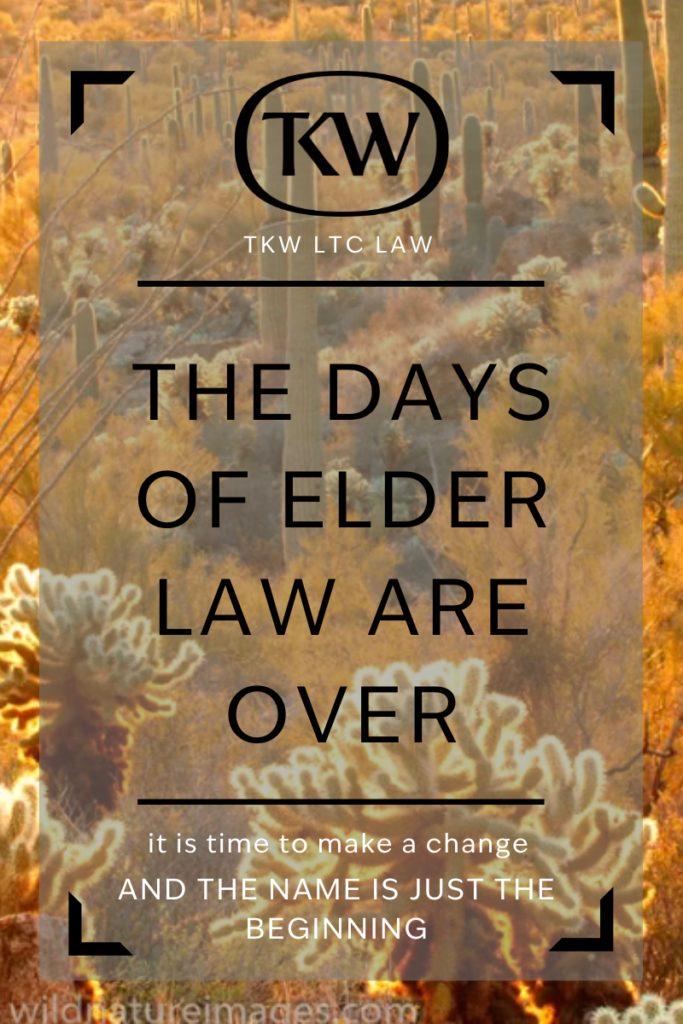Welcome to TKWhite LTC Law: A New Approach to Arizona Long-Term Care Planning
As I start a solo boutique firm, TKWhite LTC Law, I want to illustrate what I mean by LTC Law. You can learn about the services TKW offers on the firm’s website. This post speaks to two things. The firm’s name and the approach TKW LTC Law brings to Arizona long-term care planning.
Arizona “elder law” attorneys render services most like those offered at TKW. I’m breaking away from this tradition, though, even at risk of being hard for potential clients to locate. I am confident that TKWhite LTC Law’s work ethic will attract as many clients as we are able to help. Opening TKW gave me a chance to improve upon the practices I learned at a larger “Elder Law Firm.” And, I couldn’t think of a better place to begin these improvements than in the name itself.
People use the term “elder law” to describe several areas of law. For instance an Arizona elder law attorney might practice estate planning, guardianships, and malpractice claims against skilled nursing facilities. You might be asking why TKW would distinguish itself from an institution with name recognition. Or, whether TKWhite LTC Law can help clients with the legal issues that Arizona elder law attorneys typically handle.
Put briefly, I stopped using the traditional terminology because a change was long overdue. And further, I founded TKWhite LTC Law to improve upon the services Arizona elder law attorneys typically offer. I give my clients something more elevated than Elder Law attorneys. Equally important, I hope to course-correct the industry’s use of a potentially offensive term.
Why Elder Law Doesn’t Quite Fit.
Arizonans use the term elder law to describe the laws in place for folks nearing retirement or already retired. Elder law covers a wide range of legal issues, ranging from estate planning to elder abuse. For example, the protagonist in the television series, Better Call Saul, was an elder law attorney. He hustled to sell wills in nursing facilities, only to turn around and sue just such a facility.
Many Elder Law attorneys in Arizona bundle their legal services together. This approach runs a risk of becoming a jack of all trades, but master of none. I differ from these elder law lawyers because I focus on one crucial aspect of this area of law. As much as possibe, I help my clients qualify for the Arizona Long-Term Care System (ALTCS). It should go without saying that I also handle the sub-issues that arise from long-term care planning, but I have spent my career working through ALTCS Policy, so I stay in my lane as much as possible.
LTC Law Specifically Helps Arizonans Qualify for ALTCS
In case context is needed, ALTCS is Arizona’s Medicaid program that provides long-term care coverage to those in need. If found eligible, people can receive this care in care homes, as well as in their own homes. Navigating ALTCS eligibility can be complex, particularly for those who hope to preserve their assets. This is where LTC Law comes in. More pointedly than Elder Law, LTC Law helps clients qualify for long-term care without sacrificing their assets or independence.
Some of TKW’s clients need more than traditional long-term care planning. This matters not because TKW is always on the cutting edge of strategies for qualifying for ALTCS. Before TKWhite LTC Law, I worked with a larger firm that insisted their backing helped me do my job better. Handling thousands of ALTCS cases taught me otherwise, though. It didn’t take long to grasp that my elder law clients never sought my counsel in criminal matters. They only needed me to help them gain the state’s assistance to pay for their long-term care. I know many good criminal law attorneys today, and I also know I won’t call them for pointers on LTC planning.
What is Long-Term Care Law (LTC Law)?
Long-term care law, or LTC law, primarily helps individuals and families get ALTCS to pay for their long-term care. This includes assessing clients’ financial eligibility or coverage. It also includes strategically planning the best way to protect client’s assets without forfeiting the long-term care they need.
As perhaps the first true “LTC Law Lawyer,” I try to mainly help clients qualify for coverage without losing everything. There can be ancillary issues relating to this process, sure, and I do take those issues on. But as much as possible, I help clients find legal and ethical ways to qualify for ALTCS. I help them satisfy the ALTCS income and resource requirements and regain the livelihood and peace they deserve.
I create plans through which ineligible people reorganize their assets and/or income to qualify for ALTCS benefits. Clients with enough foresight can qualify before they spend everything and wind up qualifying because they are out of money. As an LTC Law attorney I help my clients qualify for the long-term care they need without losing everything for which they’ve worked. And I do this without subjecting them to an undignified label, such as elderly.
Do I need an Elder Law Attorney or a LTC Attorney?
Some might argue that I am splitting hairs by distinguishing LTC Law from Elder Law. For the reasons above, along with those I will outline in the following post, it only seems obvious that a Long-Term Care attorney would have the best advice on how to qualify for long-term care. But, don’t take my word for it. Call an Arizona elder law attorney and an Arizona LTC Attorney, then follow your instinct. When you are ready to talk more about LTC Law, contact TKWhite LTC Law for a free pre-screen to determine how we might be able to help you and your family.




